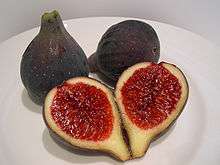Definify.com
Definition 2025
figo
figo
English
Noun
figo (plural figos)
- Alternative form of fico
- Washington Irving
- A figo for the governor, and a figo for his flag.
- Washington Irving
Esperanto
Noun
figo (accusative singular figon, plural figoj, accusative plural figojn)
- fig (fruit)
Derived terms
Galician
Etymology
From Old Portuguese figo, from Latin fīcus (“fig tree, fig (fruit)”).
Noun
figo m (plural figos)
- fig (fruit)
Related terms
Ido
Etymology
From Esperanto figo, from English fig, French figue, German Feige, Italian fico, Spanish higo, Russian фига (figa).
Pronunciation
- IPA(key): /fi.ˈgo/
Noun
figo (plural figi)
- fig (fruit)
Derived terms
- figiero (“fig (tree)”)
- figiereyo (“fig garden”)
Latin
Etymology
Back-formed from earlier fīvō (influenced by the perfect fīxī), from Proto-Italic *feigʷō (with fīxus for fictus after fīxī), from Proto-Indo-European *dʰeygʷ- (“to stick, set up”). Cognates include English ditch, West Frisian dyk (“dam”), Dutch dijk, German Deich (“dike”) and Teich (“pond”) (all from Proto-Germanic *dīkaz), Lithuanian diegti ‘to prick; plant’, dýgsti ‘to geminate, grow’), Sanskrit देहि (dehi-, “wall”) and देह (deha, “body”).
Pronunciation
- (Classical) IPA(key): /ˈfiː.ɡoː/
Verb
fīgō (present infinitive fīgere, perfect active fīxī, supine fīxum); third conjugation
Inflection
- The fourth principal part may also be fictum.
Derived terms
Descendants
References
- figo in Charlton T. Lewis and Charles Short (1879) A Latin Dictionary, Oxford: Clarendon Press
- figo in Charlton T. Lewis (1891) An Elementary Latin Dictionary, New York: Harper & Brothers
- Félix Gaffiot (1934), “figo”, in Dictionnaire Illustré Latin-Français, Paris: Hachette.
- Meissner, Carl; Auden, Henry William (1894) Latin Phrase-Book, London: Macmillan and Co.
- to keep one's eyes on the ground: oculos figere in terra and in terram
- to keep one's eyes on the ground: oculos figere in terra and in terram
- figo in Ramminger, Johann (accessed 16 July 2016) Neulateinische Wortliste: Ein Wörterbuch des Lateinischen von Petrarca bis 1700, pre-publication website, 2005-2016
- Andrew L. Sihler (1995) New Comparative Grammar of Greek and Latin, New York, Oxford, Oxford University Press
